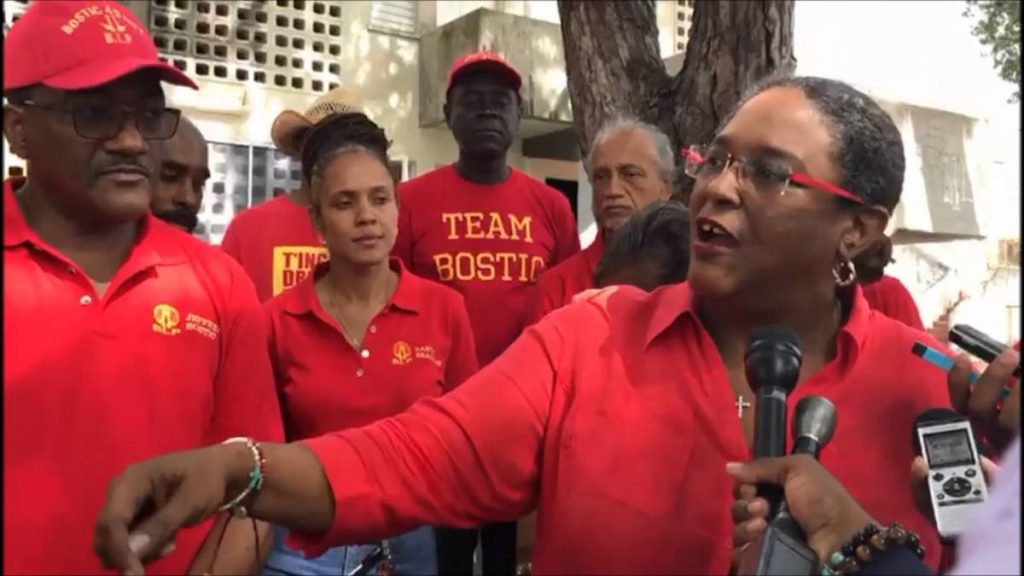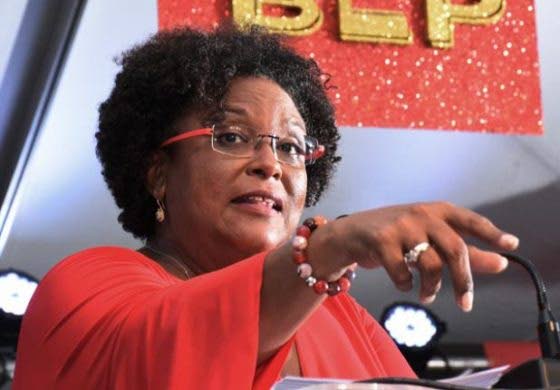Mia’s people power

Newly sworn-in Barbados Prime Minister Mia Amor Mottley never used her status of being among one of the island’s more prominent legal and political families as an entitlement to power but rather, worked hard for the success she achieved in Thursday’s general election.
So said political scientist Josh Drayton as he weighed in on the controversial election, which saw Mottley’s Barbados Labour Party (BLP) whitewash the Democratic Labour Party (DLP), led by outgoing prime minister Freundel Stewart. The DLP had governed the country since 2008.
Mottley’s BLP won all 30 seats in Barbados’ House of Assembly, obliterating the possibility of an opposition and securing the broadest victory by a political party in the island’s history.
Drayton said within the last two years, Mottley, 52, has shown herself to be a strong, competent and charismatic leader.
“As a leader, she has been able to connect, arrange and organise a team. And to be able to move a sitting prime minister and have this kind of result, means that you have to be able to mobilise your people and the whole country,” Drayton told Sunday Newsday.
He said Mottley’s achievement was also significant because she did not win with a coalition.
“This showed that she also has the ability to mobilise and if she has that, I hope that extra edge would help in mobilising Barbadians to be more productive and increase confidence in the society.”
Even so, Drayton said it would be interesting to observe how Mottley would function in her new role as prime minister.
“It is one thing to be in opposition, one thing to be an MP and an attorney general but what happens when you are the person at the helm? That is yet to be realised.”
Drayton, who lectured at the St Augustine campus of the University of the West Indies for a decade, predicted, though, Mottley would not be a maternalistic figure in office.
“I see her as one that is fair more than mothering. That is something that is different from the traditional female leader.” However, he predicted there may be some concerns on issues relating specifically to family life.
“Whereas other female leaders would have had to contend with family life, it’s very interesting how this will play out because we now have a leader who does not have any children and is not married.
“There may be a heightened focus in some of these areas. But for her, Barbados is her family and the political party (BLP).”
For Barbadians, Mottley, who was sworn in as prime minister on Friday, represents a long-awaited change, Drayton said.
“One of the biggest challenges that Barbados has had over the last three years is this general feeling of depression, that the economy is not going anywhere. So, Mia Mottley is the change that essentially Barbadians have been looking for.”
Drayton added the island’s stagnant economic climate and sectoral inefficiencies made it “ripe” for the BLP to assume power.
“I think it even surprised a lot of the political scientists and pollsters that the win was so large. Some people expected the BLP to get 20 seats but it went totally to them.”
Drayton attributed the BLP’s overwhelming victory to the DLP’s failure to effectively connect with the people.
“That was their biggest challenge. Even in the campaigns, they did not have as much conversations with the population and when (Freundel) Stewart was invited to speak at functions, he would often send a junior person.
“I think Barbadians started to look at that and saw that as almost if if they (government) did not care about them.”
On the flip side, Drayton said Mottley delivered a more inclusive, people-centred campaign in the run-up to the poll.
The BLP’s manifesto, he said, catered for all.
“It talked about university education and employment opportunities for young people and increasing pensions for old people. There was even something that spoke to the rastafarian community with respect to dialogue on decriminalising marijuana.”
Drayton also responded to questions about the mudslinging on the campaign, which, he felt, contributed to the DLP’s demise.
He said the voting population did not give into calls for Mottley to reveal her sexual orientation.
“This is the problem we have specifically with women in Caribbean politics, this extra level of scrutiny into their personal lives that a lot of men generally don’t face.”
In raising the issue, Drayton said the DLP played on Barbadians’ penchant for conservatism and spirituality.
“But the average Barbadian actually saw that campaign by the DLP as something that was not Barbadian because it became too dirty, too personal and that really did not feature significantly in terms of Barbadians voting.
“Barbadians felt this was a disrespectful campaign the DLP ran and they got tired of hearing it.”
He recalled that during the campaign, a prominent DLP member spoke frequently about same-sex marriages, much to the disgust of Barbadians.
‘People just felt there were so many other issues to address than sexual orientation, which represented a level of maturity.”
The political scientist said Mottley did not respond to the issue but kept focussed on her campaign, which dealt with alleged corruption, specifically the selling off of state property for reduced amounts.
Drayton said this has led to the formation of a private sector organisation known as Integrity Group Barbados.
He said, too, concerns have been expressed about the absence of an opposition to effectively scrutinise the BLP’s governance. Barbados has what he referred to as a social partnership to address this major deficiency.
Political commentator Dr Winford James also expressed concern about Mottley’s mandate, saying it had the potential to lead to dictatorship.
“We have to be concerned about the democracy,” James said. “I don’t care how much the people supported her party, no democracy can run effectively if you don’t have an opposition.
“So, she has been virtually elected as a dictator, been transformed by the vote into a potential dictator.”
James said scrutiny must be paid to the decisions Mottley would make in moving forward.
“We have to watch the kinds of legislation she takes to the parliament.”
James said, however, Mottley has a mandate to transform Barbados in a manner that nobody else has had.
“No other prime minister has had a free hand by the electorate to make the changes that they would like to make.
“She has been handed extreme power that probably she, herself, was not expecting and how she uses that power is going to be very important.”



Comments
"Mia’s people power"